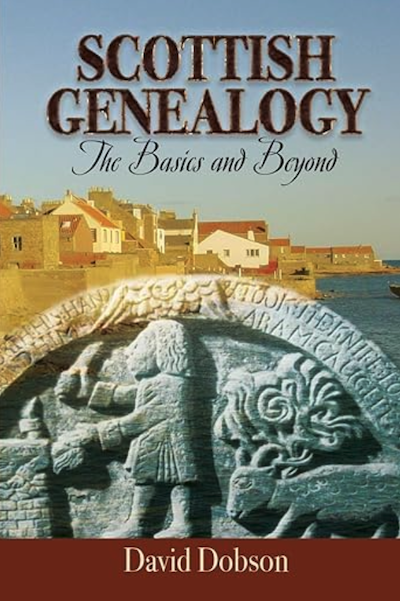The following book reviews were written by Bobby King:
The Intrepid David Dodson
 David Dobson, an industrious gentleman whose collections of names and data might otherwise have remained forever unnoticed, has had published these recent books. His dedication to his work has, no doubt, been important to the genealogies of persons of Scottish ancestry.
David Dobson, an industrious gentleman whose collections of names and data might otherwise have remained forever unnoticed, has had published these recent books. His dedication to his work has, no doubt, been important to the genealogies of persons of Scottish ancestry.
Each book has an introduction describing the places and people, and a reference guide in the back that explains the source initials in the entries.
The following books, authored by David Dobson, are published by the Genealogical Publishing Co., Baltimore, Maryland.
The People of the Grampian Highlands 1600 –1699.
The Grampian Highlands are situated in North East Scotland and extend from Aberdeenshire through Kincardineshire, the Braes of Angus, to Eastern Perthshire. The region was populated with small burghs, where a Gaelic-speaking people engaged in agriculture. Emigration did not occur until early 1700s, except for war prisoners who were banished to the Plantations.
Example entry: FLAGER, DUNCAN, and his wife Agnes Bowman, in Kirkton of Lochlee, Angus, testament, 1627, Comm. Brechin. [NRS].
The People of Glasgow and Clydesdale at Home and Abroad 1800 –1850.
Glasgow’s rapid industrial growth, in the early 1800s, while beneficial to entrepreneurs and industrialists, brought social unrest to the working class with poor wages, child labor practices, and epidemics. Emigration from Glasgow to the newly-industrializing United States appealed to the working class and white-collar insurance and banking professionals. This book identifies people from Glasgow and neighboring Clydesdale who emigrated during the first half of the nineteenth century.
The People of Barbados 1625 –1875.
Captain John Powell claimed Barbados in 1625 for the English Crown, and two years later settlers from England followed to the island. English and Welsh entrepreneurs set up tobacco, sugar, and cotton plantations utilizing for laborers indentured servants, skilled artisans, rebels, criminals in chains, and African slaves. As the population increased and land became scarce, a second migration of laborers, planters, merchants and slaves set out for the Americas.
The People of North East Scotland at Home and Abroad 1800 –1850.
This book identifies people from old counties of Nairnshire, Morayshire, Banffshire, Aberdeenshire, and Kincardineshire. The main clans and families here were Rose, Grant, Dunbar Brodie, Innes, Gordon, Leslie, Ogilvie, Keith, Forbes, Hays, Barclay, Fraser, Skene, Farquharson, Arbuthnott, Burnett, Irvine, and Douglas.
The People of Aberdeen at Home and Abroad 1800 –1850.
Old Aberdeen, founded 1125, and New Aberdeen, founded 1214, merged in the mid nineteenth century to become a major city and port embracing fishing and agricultural industries, exporting textiles, shipbuilding, and papermaking. This book contains references to people of Aberdeen from 1800 to 1850.
The People of South West Scotland at Home and Abroad 1800 –1850.
This book identifies people in or from the counties Renfrewshire, Ayrshire, Dumfries-shire, Kirkcudbrightshire, and Wigtownshire. Emigration from South West Scotland shifted from Ulster in the seventeenth century to North America and Australia by the nineteenth century.
People of the Hebrides at Home and Abroad 1800 –1850.
This book identifies residents of the Hebrides, a group of islands off the west coast of Scotland, especially Skye, Islay, Mull, Lewis, and Harris, and Hebrideans who emigrated to the Carolinas, Maritime Canada, and Australia during the early nineteenth century.
The People of Leith at Home and Abroad 1600 –1799.
This book identifies residents of Leith during the seventeenth and eighteenth centuries. Leith lies on the south shore of the Firth of Forth, and with a thriving seafaring economy of shipbuilding and whaling, was the most important port of Scotland until the Clyde ports of Glasgow-Greenock became predominant.
The People of Fife at Home and Abroad 1800 –1850.
This book identifies residents and former residents of Fife, a coal mining region and major producer of textiles that lies on the east coast of Scotland. In the Dark Ages, it was a Pictish province which, in the nineteenth century, became a center of heavy industry.
The many books by David Dobson are available from the Genealogical Publishing Company at: https://genealogical.com/store/?gpc_search=1&textinput_author_last_name=Dobson as well as from Amazon.
 Latest News Articles
Latest News Articles Do you have an RSS newsreader? You may prefer to use this newsletter's RSS feed at:
Do you have an RSS newsreader? You may prefer to use this newsletter's RSS feed at: